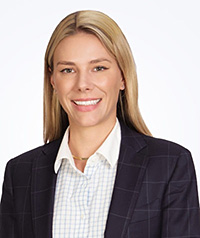The interview below is part of an ongoing effort by McGuireWoods to profile women leaders in private equity (PE). To read previous profiles, click here. To recommend a woman for a future interview, email [email protected].
 Alissa Walker is a vice president focusing on midmarket buyout funds for Trivest, which she joined in 2022. She is involved in all aspects of the investment process and portfolio company management within the firm’s buyout funds.
Alissa Walker is a vice president focusing on midmarket buyout funds for Trivest, which she joined in 2022. She is involved in all aspects of the investment process and portfolio company management within the firm’s buyout funds.
Prior to joining Trivest, Walker was with another PE firm, where she spent three years evaluating and executing new investments and supporting portfolio companies. Before PE, Walker held various positions within investment banking, corporate development and valuation supporting founder-owned businesses.
Walker holds a BS in finance and accounting from Bentley University.
Q: Why is having a diverse team important in PE and for entrepreneurs?
Alissa Walker: Companies shouldn’t build diverse teams just because it’s expected. There are proven benefits to diversity. When people think of diversity, they traditionally think of tangible, visible properties such as race and gender, but the broader concept of diversity concerns building teams with people from different backgrounds and life experiences — qualities that are more difficult to see on a company website. Bringing together different experiences and backgrounds brings different perspectives and approaches to problem solving and decision making, which allows for better, faster solutions.
Building a diverse team also will help companies recruit and retain the best talent by fostering inclusivity and a positive culture. PE is a people business, and like attracts like. Whether you’re at a firm, a company that’s continuing to build its talent, or working to attract entrepreneurs to partner with, it benefits you to have that representation within your team.
Given Trivest’s focus on family- and founder-owned businesses, having a diverse team is especially important. Most founders and management teams, especially in our generalist focus, come from various backgrounds, which highlights the importance of having a team of individuals from various backgrounds. This is one of the reasons we have a diversity committee that I’m proud to be part of.
Q: How will women of your generation be able to influence the PE industry, particularly as the career path continues to evolve?
AW: Women historically have been excluded from this space, so their experiences, ideas and perspectives have not been appropriately utilized and/or reflected. To my point earlier, I think seeing more senior women in PE will help attract and retain more women and push inclusion initiatives that historically may have been overlooked by firms, given their demographics.
I believe firms with more women in senior roles ultimately will be more successful. Women often bring a different way of thinking to their teams. Women often are detail-oriented, with the ability to think in many different directions while still working effectively “in the weeds.” These capabilities can help supercharge teams.
One of the reasons I joined Trivest was because Trivest understands the importance of diversity within its teams. I am one of four women deal team members at Trivest, and I find my colleagues to be incredibly talented and impressive individuals. We continue to hire women across the firm as we search for best-in-class candidates.
Q: What role should mentorship play in PE?
AW: During my career, I’ve been able to learn under a variety of mentors, and I wouldn’t be where I am today without them. Among them are Matt Devine, Greg Baldor, Elizabeth Strehl and Andrew Johnson. I think it’s important for anyone joining a new firm to have a mentor in the organization.
I recently participated on a panel focused on women in PE. I learned that another firm assigns mentors to all its employees, with those mentors intended to be resources for new team members. I think that’s smart. In previous jobs, I’ve been fortunate to have someone take me under their wing, which helped me get to where I am today. I hope more senior leaders will recognize mentorship as something that is helpful for junior employees.
I do want to emphasize the importance of mentorship for women in PE, which is an industry historically dominated by men. Individuals can inherently feel reluctant to join an industry, a job or a team if they do not see like representation and inclusiveness in the setting. Women who are already in positions within PE firms will be well-served to look for opportunities to be mentors to other women.
Q: What is required for success in PE?
AW: As with other industries, success often boils down to putting in the time and work and having a do-whatever-it-takes attitude toward completing one’s work.
PE is a people business, so the ability to connect with others is essential. As I mentioned, Trivest invests in family- and founder-owned businesses — companies usually built with a lot of blood, sweat and tears. It’s imperative that we connect with those owners and make them feel comfortable and confident that they are partnering with a firm that has people who really care about their companies and will work to continue the success of their businesses and brands.
In terms of women being successful, the advice I would give my younger self would be to speak up more and be more confident. Imposter syndrome can hold women back. Men are sometimes naturally more confident than women, not necessarily for any rhyme or reason. We need to remember that we’ve earned our places at the table and carry ourselves in ways that reflect what we’ve earned.
To contact Alissa Walker, email [email protected].